How does the Pfizer coronavirus vaccine work?
UK becomes first nation to approve vaccine paving way for roll out
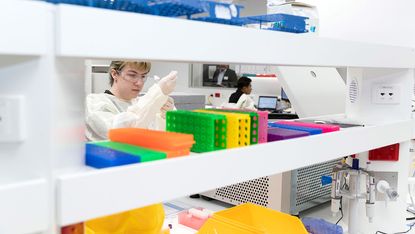
The UK has become the first country in the world to approve a coronavirus vaccine for widespread use after regulators gave the green light to the Pfizer-BioNTech jab.
The Medicines and Healthcare products Regulatory Agency (MHRA) approved the vaccine on Wednesday, after the body was given power to approve the drug by the government under special regulations.
Albert Bourla, the chairman and chief executive officer of Pfizer, said the UK’s decision “marks a historic moment in the fight against Covid-19”, adding that “science will win”.
Subscribe to The Week
Escape your echo chamber. Get the facts behind the news, plus analysis from multiple perspectives.

Sign up for The Week's Free Newsletters
From our morning news briefing to a weekly Good News Newsletter, get the best of The Week delivered directly to your inbox.
From our morning news briefing to a weekly Good News Newsletter, get the best of The Week delivered directly to your inbox.
How was it approved?
Pfizer was the first company to announce highly promising results from its Phase 3 trials, revealing that the jab has around 95% efficacy.
Concerns were raised over the fact that the drug must be stored at -70C, posing a practical challenge for health services, but the UK nevertheless bought 40m doses and granted the MHRA special powers to approve the jab at unprecedented speed.
No. 10 has now said the vaccine has been given the green light and will be rolled out across the UK from early next week, while Scottish first minister Nicola Sturgeon said Scotland’s first doses will be administered on Tuesday.
“Batch testing has been completed this morning for the first deployment of 800,000 doses of the vaccine,” Health Secretary Matt Hancock told the Commons today. “This is a day to remember in a year to forget,” he added.
Hancock has vowed to launch an extensive “public information campaign” to boost trust in the vaccine’s safety following concerns that efforts to achieve herd immunity among the population will be undermined by vaccine sceptics, and has even vowed to take the vaccine live on air to prove it was safe.
In a further attempt to reassure the public, MHRA chief Dr June Raine this morning insisted that “no corners have been cut” in approving the vaccine, despite vaccines usually taking “around a decade from start to finish before they hit the shelves”, City A.M. reports.
“Our expert scientists and clinicians have worked round the clock, carefully and methodically poring over tables, analyses and graphs on hundreds of thousands of pages of data,” Raine said. “The safety of the public will always come first”.
How does it work?
Most vaccines rely on weakened or inactivated parts of the virus to provoke an immune response in their recipients, but the Pfizer version is synthetic.
The new vaccine is made using messenger ribonucleic acid (also known as messenger RNA or mRNA). Whereas DNA is where we store our genetic information, mRNA - as its name suggests - transmits information and helps to determine how our genes are expressed.
To put that another way, mRNA “essentially puts DNA instructions into action”, says Horizon.
In the case of the Pfizer vaccine, the researchers synthesised a form of mRNA that will “cause our own cells to make a viral protein” from the Covid-19 coronavirus, says The New York Times.
The protein is harmless in isolation, but prompts the human immune system to “make antibodies and immune cells that can recognise the protein quickly and deliver a swift attack”, the newspaper adds.
Since the active ingredient in the vaccine - the mRNA - is “made from a DNA template in a lab”, says Pfizer, scaling up production is “a more rapid process than [with] conventional vaccines and a major advantage when it comes to sudden pandemics”.
Create an account with the same email registered to your subscription to unlock access.
Sign up for Today's Best Articles in your inbox
A free daily email with the biggest news stories of the day – and the best features from TheWeek.com
Holden Frith is The Week’s digital director. He also makes regular appearances on “The Week Unwrapped”, speaking about subjects as diverse as vaccine development and bionic bomb-sniffing locusts. He joined The Week in 2013, spending five years editing the magazine’s website. Before that, he was deputy digital editor at The Sunday Times. He has also been TheTimes.co.uk’s technology editor and the launch editor of Wired magazine’s UK website. Holden has worked in journalism for nearly two decades, having started his professional career while completing an English literature degree at Cambridge University. He followed that with a master’s degree in journalism from Northwestern University in Chicago. A keen photographer, he also writes travel features whenever he gets the chance.
-
 Who actually needs life insurance?
Who actually needs life insurance?The Explainer If you have kids or are worried about passing on debt, the added security may be worth it
By Becca Stanek, The Week US Published
-
 Sexual wellness trends to know, from products and therapies to retreats and hotels
Sexual wellness trends to know, from products and therapies to retreats and hotelsThe Week Recommends Talking about pleasure and sexual health is becoming less taboo
By Theara Coleman, The Week US Published
-
 Is the AI bubble deflating?
Is the AI bubble deflating?Today's Big Question Growing skepticism and high costs prompt reconsideration
By Joel Mathis, The Week US Published
-
 Covid four years on: have we got over the pandemic?
Covid four years on: have we got over the pandemic?Today's Big Question Brits suffering from both lockdown nostalgia and collective trauma that refuses to go away
By Chas Newkey-Burden, The Week UK Published
-
 The hollow classroom
The hollow classroomOpinion Remote school let kids down. It will take much more than extra tutoring for kids to recover.
By Mark Gimein Published
-
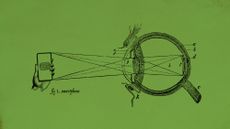 Excess screen time is making children only see what is in front of them
Excess screen time is making children only see what is in front of themUnder the radar The future is looking blurry. And very nearsighted.
By Devika Rao, The Week US Published
-
 Covid-19: what to know about UK's new Juno and Pirola variants
Covid-19: what to know about UK's new Juno and Pirola variantsin depth Rapidly spreading new JN.1 strain is 'yet another reminder that the pandemic is far from over'
By Arion McNicoll, The Week UK Published
-
 Long-term respiratory illness is here to stay
Long-term respiratory illness is here to stayThe Explainer Covid is not the only disease with a long version
By Devika Rao, The Week US Published
-
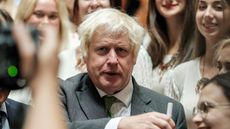 Covid inquiry: the most important questions for Boris Johnson
Covid inquiry: the most important questions for Boris JohnsonTalking Point Former PM has faced weeks of heavy criticism from former colleagues at the public hearing
By The Week Staff Published
-
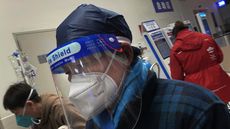 China's pneumonia cases: should we be worried?
China's pneumonia cases: should we be worried?The Explainer Experts warn against pushing 'pandemic panic button' following outbreak of respiratory illness
By Keumars Afifi-Sabet, The Week UK Published
-
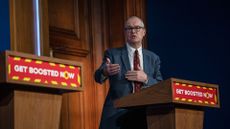 Vallance diaries: Boris Johnson 'bamboozled' by Covid science
Vallance diaries: Boris Johnson 'bamboozled' by Covid scienceSpeed Read Then PM struggled to get his head around key terms and stats, chief scientific advisor claims
By The Week UK Published